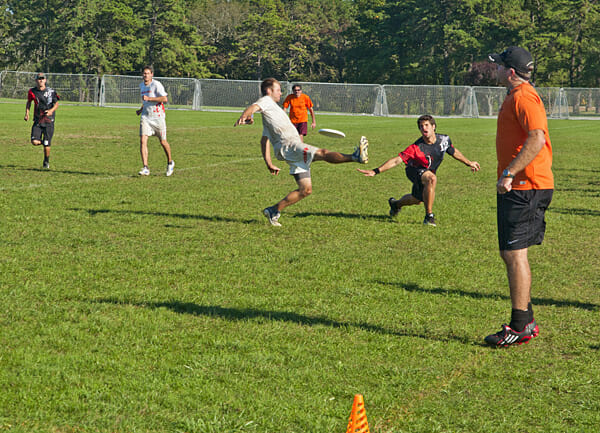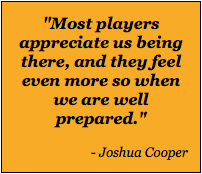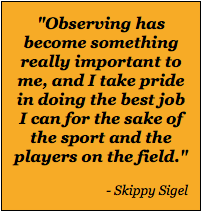September 17, 2012 by Adam Ford in News, Other with 1 comments

 This is the third article in our series, Team Orange: A Comprehensive Guide to the USA Ultimate Observer Program. Includes contributions from Will Deaver and Vic Kahmi.
This is the third article in our series, Team Orange: A Comprehensive Guide to the USA Ultimate Observer Program. Includes contributions from Will Deaver and Vic Kahmi.
At the Boulder Fourth of July Classic one year in the 90s, I got cheated. There was a relatively new but very athletic player on the other team and I, as a fast defender, was assigned to cover him. During one point, he got the disc in the middle of the field, and I set up to mark him. He made a backhand throw and i blocked it to the ground.
It was clearly, clearly a foot out of his hand when I hit it, but because he could, he called “foul.” What could I do? Had there been Observers, I could have asked for a ruling, but all I could do was contest the call and what should have been our disc remained with our opponents.
To many people, the most important role of Observers is to prevent cheating. Observers are brought into games that get chippy and are often there to calm a game down. But in reality, the main role of Observers is to keep the game moving. An observed game has time limits on time-outs, halftime, and between points. If there is a call during play that’s not resolved quickly, an Observer can step in and encourage either a resolution or a referral for a ruling.
Sometimes even a quick clarification on the rules will help in getting the game going again. There have been many times when a call is made, both players discuss it for 20 or 30 seconds, and then I’ll move in and ask “Do you have a resolution on this?” Sometimes they do and play is continued. Sometimes they’ll shrug or say no and I’ll ask “Do you want a ruling?” Even at that point, one player or the other will agree to simply contest the call and play resumes. So even when Observers are not making any rulings, we’re keeping the fans from getting bored.
Of course, we don’t want players or teams to cheat either. Any close call can be played over and it’s great when teams opt for that rather than asking for a ruling, but if a player is deliberately bending the rules for their own gain, that’s when having Observers can make a difference.
Still, there are some who are not fond of the whole concept of Observers and there are others who are suspicious of why their game is being observed. Was it something they, as a team, did? Does another team think that they have poor spirit and need to be watched? Well, yes and no.
 As a Head Observer at tournaments, I work closely with the Tournament Director (TD) and the Regional Coordinators to decide which games will be observed. Some teams request Observers for games against longstanding rivals, others request Observers for key games such as crossovers or elimination rounds. If we had enough Observers to accommodate all requests, we would, but the fact is that there aren’t enough. And for some tournaments, there are budgetary constraints to consider (generally, Observers get hotels and lunches covered, but not much else. Travel is covered to national tournaments.)
As a Head Observer at tournaments, I work closely with the Tournament Director (TD) and the Regional Coordinators to decide which games will be observed. Some teams request Observers for games against longstanding rivals, others request Observers for key games such as crossovers or elimination rounds. If we had enough Observers to accommodate all requests, we would, but the fact is that there aren’t enough. And for some tournaments, there are budgetary constraints to consider (generally, Observers get hotels and lunches covered, but not much else. Travel is covered to national tournaments.)
This makes it difficult to put Observers on every game that might need them. I’ve been to tournaments where, due to a small crew, we’ve had to leave certain pools or even divisions to their own devices and concentrate on games that we felt should be observed. But regardless of what the priorities are, one of the things that’s good about the Observer system is that you don’t need it to play a fair game. If there are four games to observe (say, Open and Women’s semi-finals), and only three sets of Observers, one game doesn’t get observed, and that’s okay.
So how do we decide which games to observe? Sometimes it’s two closely seeded teams against each other, sometimes it’s because of earlier less-than-spirited play in the tournament, sometimes it’s word-of-mouth or first-person accounts of a certain team at an earlier tournament, but there are plenty of non-judgmental reasons as well. I’ll pick a pool and throw a set of Observers on the #2 vs. #3 game, or we’ll decide to observe a team that has never played with Observers before. In the early Saturday rounds, I will assign Observers to less critical lower-ranked games both to expose teams to Observers and to give the Observers some game time before the elimination rounds later in the weekend. Basically, if Observers show up at your field, don’t take it as a personal insult that we don’t think you play with enough spirit. The more games we can observe, the better we get. As Tom Rath put it, “If a player feels at odds with Observers, they shouldn’t; it’s their game. We are there to help.”
What Does an Observer Do?
According to the USAU Certified Observers Manual, “As an Observer, your fundamental role is to help players uphold the Spirit of the Game.” That’s fairly vague, but there are a lot of small elements that go into achieving that goal. Here’s a list of what an Observer does: An Observer…
- Knows the rules and is available for rules clarification at any stoppage of play during a game.
- Always behaves in a professional manner.
- Communicates with both teams via coaches or captains at the start of the game, after any serious infractions, and in overtime, soft cap, and hard cap situations.
- Keeps track of timing, the score, time-outs taken, and any penalties incurred.
- Makes active line calls (in, out, not-in the end zone) for players and the disc.
- Makes active off-sides calls.
- Makes rulings on disputed calls when needed.
- Monitors player and team conduct, defusing unspirited situations when necessary.
- Stays alert, stays as close to the play as possible without interfering, and does not get to sub out.
 I, like all Observers, strive for professionalism. We represent USAU and it’s incumbent on us to be ready to make any call at any time and to make the right call. Have I blown any calls? Some people have argued with me about certain calls, and there have been some which, in hindsight, I may have called differently, but most of the time, I’m on top of the play and have a fairly certain idea of what happened. I always think about a game that I’ve observed after it’s over and feel good if none of my rulings were “game changers.”
I, like all Observers, strive for professionalism. We represent USAU and it’s incumbent on us to be ready to make any call at any time and to make the right call. Have I blown any calls? Some people have argued with me about certain calls, and there have been some which, in hindsight, I may have called differently, but most of the time, I’m on top of the play and have a fairly certain idea of what happened. I always think about a game that I’ve observed after it’s over and feel good if none of my rulings were “game changers.”
But, of course, Observers are not infallible. “There is one glaring example of one I got wrong,” says Chris. “It was a ‘jump ball’ that at real-time seemed to be a legitimate tie situation, so I kept the disc with the offense. The next day I saw a still of that same play. The defense clearly had it first.”
“We are there to get it right and anything less is a failure,” says Mitch. “That being said, some of my biggest growth as an Observer has come from learning from mistakes.”
I’ve found that sometimes the hardest call to make is the non-call. If i truly didn’t see a play, whether I was screened by a player or just watching a different cutter than the one making the call at the time, I have no problem with quickly announcing, “I didn’t see the play—honor the call.”
But sometimes even when you’re right where you need to be, the facts are not obvious. There was a play at College Regionals where a player dove for a disc in the endzone, it landed in his outstretched hand, bounced up, hit… something… before he grabbed it a second time and held on. His defender claimed that the disc hit ground. The receiver claimed that it bounced off his arm. From my perspective, about 15 feet away, it looked to have hit on the inside part of his arm, or maybe the ground, but his arm was blocking my view. If i rule it was up, goal. If i rule down, turnover. This was late in the game and either call could have shifted the momentum of the game. I couldn’t make either call, so i sent the disc back to the thrower. Sometimes the old way of resolving disputes works the best.
From the USAU Certified Observers Manual:
[quote]”Your job is not to render justice. Players sometimes will agree on the “wrong” solution (i.e., you may feel that the players’ decision—perhaps a do-over—is not supported by what actually occurred). In such cases, do not intervene or suggest an opinion. It is preferable that players settle matters amongst themselves rather than have a non-player make a ruling.”[/quote]
Will Deaver lives in Louisville, CO with his wife Melanie and sons Liam and Jack. He started playing Ultimate in 1993 at the University of Georgia and is currently the USA Ultimate Managing Director for Competition and Athlete Program. Vic Kahmi currently lives in Massachusetts. Actively Observing since 1989, he has participated in Regionals (MA and NE), Nationals (College and Club), and WFDF Worlds. He was UPA Head Observer for a dozen years.